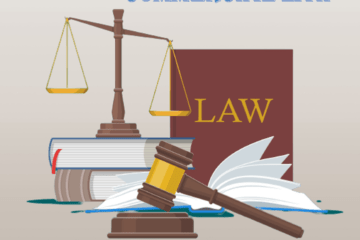
This article is written by Avishka Saini of 5th Semester of Delhi Metropolitan Education, Noida, an intern under Legal Vidhiya
ABSTRACT
This study examines the complex and multidimensional character of business law, looking at its underlying ideas, shifting dynamics, and significant influence on contemporary trade. This study aims to offer a thorough grasp of the true nature of business law by looking at its historical evolution, important legal ideas, and current difficulties. This article clarifies the crucial role business law has in influencing economic transactions, enabling fair competition, and ensuring ethical corporate behavior through the consideration of pertinent case studies and academic opinions.
KEYWORDS:
commercial operations, stakeholders interests, concept of equity, current applicability, difficulties and possibilities, seamless transactions, business law
INTRODUCTION
The corporate landscape’s commercial operations, exchanges, and relationships are governed in large part by business law. Its importance is derived from its capacity to ensure seamless transactions, protect stakeholders’ interests, and promote the concepts of equity and justice. In order to understand the complex layers of business law, this article will look at its historical development, fundamental principles, and current applicability. I want to chat to you about the topic of our present and our future today. Future directions for the field are numerous, and the business law schools of today will influence what the field looks like in the future. There will undoubtedly be difficulties and possibilities with these potential futures. These obstacles must be anticipated, and we must be ready for the opportunities that will unavoidably upset business.
Business: What Is It?
One definition of “business” given by Akrofi (2019) is “the production, distribution, and sale of goods and services for a profit.” When the definition is critically analyzed, additional important terms like production and distribution are defined as follows. The first definition of production is the act of creating, producing services, or transforming raw materials into finished goods. One illustration is the transformation of iron ore into automobile components and gold ore into jewellery. Distribution is the process of getting these goods from their manufacturing locations to the workplace. It asserts that justice and the law are related. As long as there is social harmony between them, but when a dispute arises and one party seeks an injunction for fraud or damage done to their property, these laws aid in delivering justice to that party. Digitalization of Business Law: The Need and Industrial Revolution’s Focus 4.0 and the 5.0 Society It explains how business law is being digitalized and how this is significant given the advancement of information technology. The overlap of laws and regulations will be lessened, and it will also advance progress. Since nothing is permanent, our demands and requirements are constantly changing as time goes by As a result, they must be needed to be updated or modified over time. Digitalization will make amending or changing any law much simpler and more efficient. The digitalization of laws will be crucial for their success in the modern era as many organizations have begun to conduct their business online. The advancement or development of legal science will result in considerably more effective justice delivery.
Economic democracy and the Application of Business Ethics and Law that Affects Business Sustainability
It claims that since every business has its own principles and policies and because every country has its own laws and regulations, it is important to regulate all business activities with uniform laws in order to promote uniformity across all countries. the use of business ethics corporation ethics plays a big role in a company; if a corporation or organization wants to run successfully, they must also apply strong ethics to its operations in addition to good management and high-quality human resources. 2018 As a component of the community, business activity cannot be isolated from it. Consequently, there is a need for rules or social standards in commercial activity involving the community. Due to the ongoing interaction between business and society, new ethical standards are emerging in business practices, whether it be in regards to how corporate ethics are related to the community, to other company associates, or both directly and indirectly. Currently, a large number of startups and micro, small, and medium-sized businesses exist. Many people think creatively about how to leverage the numerous business possibilities that arise to start new businesses or pursue entrepreneurship.
Of course, a company establishment authorization from the Ministry is required in order to start a business or other commercial entity such as a corporation. 2018 Businesses or businesspeople can easily win the public’s or other business people’s trust by implementing ethics into their operations. Because if we uphold ethics correctly, we will be viewed as competent or qualified to lead a firm in the future. Sugata and Ali (2022) Previous researchers have extensively researched business ethics, such as (Kholisoh & Ali, 2020), (Hasoloan, 2018), (and Hanie, 2015). It states that there are two points of view, one from the perspective of business, and the other from the perspective of the general public. Both are protected from fraud by business rules.
HISTORICAL EVOLUTION OF BUSINESS LAW
Business law’s historical development can be traced to the emergence of the first commercial regulations in the prehistoric era, which served to promote commerce and settle disputes. The gradual transition from informal legal systems to established procedures that characterizes the development of business law. The foundation for contemporary business jurisprudence was created by the development of the English common law system and the formation of important legal concepts like contracts and torts.
Core Ideas and Ideas:
Business law comprises a wide range of legal ideas that regulate many facets of economic activity. Contract law, property law, intellectual property rights, corporation law, and competition law are important ideas. For instance, contract law, which forms the basis of economic transactions, regulates the creation, enforcement, and cancellation of agreements. Intellectual property protections encourage innovation and creativity in the corporate world by defending inventions and works of art. Corporate entities are subject to regulation under both company and competition laws, which also protect fair trade. The majority of the literature on companies law is devoted to discussing the law pertaining to registered companies as set forth in the various companies Acts or laws regulating the incorporation and management of Companies, but throughout these discussions, reference is constantly made to the general aspect of business organization, sometimes by way of analogy. William T. Allen and Reinier Kraakman assert that corporation law, in particular, deals with the formation and administration of the private legal organizations that serve as the main economic actors in contemporary society. As a result, it concerns the management of enormous concentrations of power and wealth. It discusses crucial problems such how corporate organizations are founded and funded, how control over internal affairs is allocated, how their economic performance is tracked, and what tools are available to boost performance.
WHAT BUSINESS LAW IS FOR
What should company law be studying? is a question that instantly comes to mind while evaluating the scope of company law. Should the Companies Act be the exclusive application? Does that encompass a partnership? Should taxes be involved? The laws governing corporations and other types of business enterprises are covered in company law, with a focus on business companies.
What should a company corporation be used for? Our study of company law will be more narrowly focused and have a more defined scope as a result of the purpose. The title of the course “Corporations and Other Business Enterprise” is quite broad. The terms “Business Corporations” have a more defined definition than “Business Organizations” or “Enterprise Organizations.” One common type of business or organization that is not an association is excluded from the phrase “Business Association.” Challenges and complexity of today. The complexity of international trade, the rapid improvements in technology, and the globalization of commerce have created new problems for business law in the digital age. Concerns about data privacy, cybercrime, and e-commerce rules are on the rise. In addition, the ethical aspects of corporate law have become more prominent, making a balance between profit-driven goals and social responsibility necessary.
THE ROLE OF BUSINESS LAW IN MODERN COMMERCE
The importance of business law in modern commerce can be summed up as follows: business law shapes corporate behavior and protects the interests of several stakeholders, such as shareholders, employees, and customers. It offers a well-organized framework for resolving conflicts, upholding legal commitments, and upholding corporate governance norms. Additionally, by outlawing monopolistic behavior and fostering healthy competition, company law maintains the efficiency of the market.
PROBLEM AREA
Two sections make up the main issue with corporate law. The country’s laws must first be implemented correctly. Sometimes laws appear beautiful but after implementation seem to have trouble functioning properly. As a result, the law that was created must be practically feasible and implementable. Making laws without keeping their application in mind will result in useless legislation. Without comprehending the nature of their own business environment, many nations have occasionally imitated the rules of other nations. That will also lead to a conflict between customers and businesses. commercial law must be able to safeguard people’s rights and interests against commercial abuses in countries where firms are more powerful than people and people are unable to protect their own interests. On the other hand, certain nations demand the creation of business regulations that are favorable to merchants who start businesses because doing so is regarded as a challenging undertaking there. Because the company will be one of the primary contributors to the nation’s economy, it is crucial for them to streamline the process and operations of the firm. Since healthy businesses require good business laws to operate, no country can now build its economy without them. As a result, business laws will indirectly help the economy of the nation. Second, effective business rules must be developed that can endure in the nation’s business climate and be accepted by both merchants and citizens. This will only be feasible if the laws are able to protect the interests of both parties and are practically possible to follow. Law must not be too onerous in conducting business or else it would reduce the number of firms in the nation, which will significantly slow down the nation’s economic progress. it should not be unnecessary in favor of businesses, otherwise it will initiate scams and frauds in the country.[1]
Case Studies:
This article demonstrates how business law affects actual situations through the consideration of relevant case studies. The Enron crisis emphasizes the value of good corporate governance and the consequences of unethical behavior. The Apple v. Samsung patent dispute serves as a reminder of how important intellectual property protection is in the field of technology. These instances highlight the delicate interaction between legal and business factors.
The Business Law Landscape of the Future:
Recognizing the need for flexible laws that can adapt to technological improvements, shifting market dynamics, and altering consumer behavior is an important part of anticipating the future of company law. For cross-border transactions to be frictionless, business laws must be harmonised internationally. A further factor in promoting ethical corporate practices through legal frameworks is their importance.
CONCLUSION
The true substance of business law goes beyond its legal requirements and procedures, in this regard. It embodies a dynamic synthesis of historical history, fundamental ideas, and present-day problems that collectively mold the commercial landscape. It is crucial for corporations, attorneys, and policymakers to comprehend its nuances in order to maneuver the complex web of commerce while respecting justice, equity, and ethical norms. The complexities of business law must change to ensure its continuous applicability and efficacy as the global business world does.
REFERENCES
- https://www.researchgate.net/publication/326871492_On_the_Future_of_Business_Law
- https://taxguru.in/corporate-law/true-nature-business-laws.html
- https://indiafreenotes.com/scope-and-sources-of-business-laws/
- https://www.elibrary.imf.org/view/journals/063/2022/001/article-A001-
- https://gyankovandar.com/2022/03/meaning-and-definition-of-business-law.html
- https://www.shiksha.com/online-courses/articles/understanding-business-law/
[1] https://www.researchgate.net/publication/353652391_Can_We_Really_Defund_the_Police_A_Nine-Agency_Study_of_Police_Response_to_Calls_for_Service ( Accessed: 12 August 2023)




0 Comments